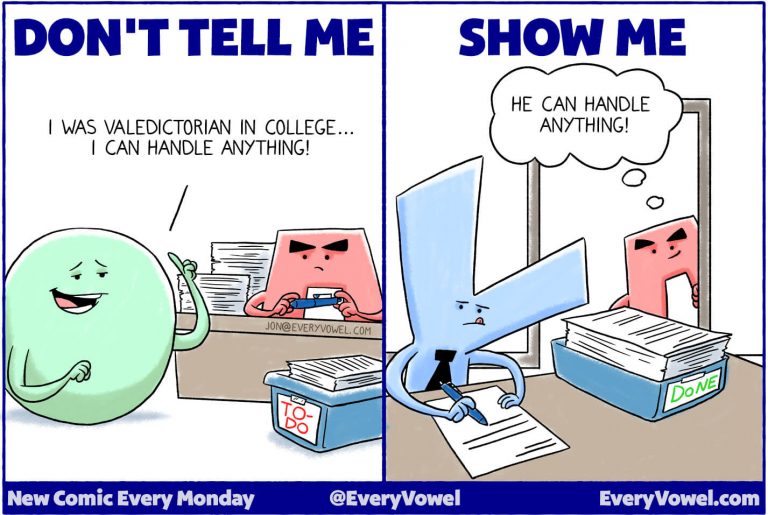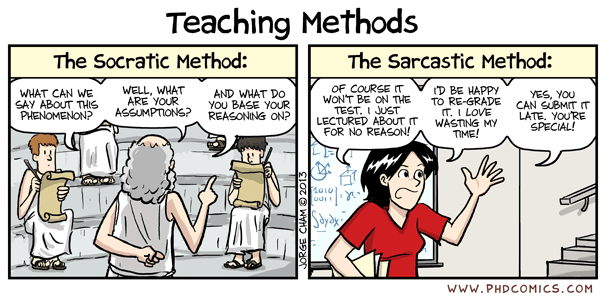How to Be a Good Mentor: Use these 10 Mentoring Tips to be the Best Mentor Ever
It takes a special set of skills and techniques to be a good mentor. In this blog we’ll go over the top 10 things you can do to become a better growth mentor.
We all have valuable experience and life lessons that we can pass on to people.
It’s just that not everyone has the skills needed to effectively communicate their expertise. Most people just need a mentor to teach them how to be a mentor.
The good news is that these skills can be learned and nurtured over time.
That’s why today, we’re taking some time to tell you a little more about what makes a good mentor in the hope that you can take it and run with it and apply it to your own mentorship style.
Here’s what works.
Show, don’t tell
There’s an old idiom amongst writers that goes, “Show, don’t tell.”
Master writer Ernest Hemingway is often cited as the source of this advice, and the general idea is that a story is better when you show things instead of just saying them. For example, simply saying something like “he was angry” is much less evocative than saying “he screamed and punched the wall.” The first example tells. The second example shows.
When you show people something, they’re much more likely to buy into it. When you’re reading a book, this is called “suspending your disbelief”.
That’s why we’re able to read fantasy novels about hobbits and dragons without scoffing at it and saying, “Impossible.” A good writer tells their story by showing instead of telling, and that leads to the reader suspending their disbelief for long enough to enjoy the story.
Now, you might be wondering what this has to do with mentoring, but the interesting thing is that the idea of showing and not telling works just as well when it comes to interpersonal communication.
If you look at footage of Steve Jobs revealing new Apple products, for example, he doesn’t just focus on the features. The iPod wasn’t successful because it was a portable music player with 5 GB of storage. There were plenty of those.
It was successful because Jobs talked about how it enabled people to carry 1,000 songs in their pocket.
He showed while everyone else was telling.
On top of that, simply telling people what to do stifles their individualism and their creativity.
The best mentors realise that and avoid just telling people what to do. It’s their job to provide the directions and not to drive the car.
Use the Socratic method
The Socratic method is an approach to carrying out a dialogue in which the goal is to get someone to arrive at the conclusion that you want them to arrive at by asking them questions.
If they arrive at the conclusion on their own behalf then they’re much more likely to take that conclusion seriously. You’d be surprised at how much of a difference it makes to ask “do you think that’s a good idea?” instead of saying “that’s not a good idea.”
Using the Socratic method stops people from feeling as though you’re talking down to them and just telling them what to do, even though you’re still guiding the general direction that the conversation takes.
It works so well that it’s a popular technique amongst street activists who are trying to change people’s minds and to encourage them to support their cause.
They use it because it works – and it can work for your mentorship, too.
Listen
The ability to properly listen to people is a skill that not everyone has, but it’s also one that can be worked on and developed.
Properly listening to someone requires a certain amount of concentration, especially if you want to be able to respond with some actionable suggestions. You can’t just sit back and keep your ears open. You need to listen carefully to both the words and the way that they’re said.
If you want to be a good listener, you need to take notes, ask questions and otherwise engage with what’s being said. Writing things down helps you to remember it while asking questions will help you to make sure that you understand what’s being said.
You can’t provide your best advice to someone unless you understand exactly where they’re coming from.
Treat your mentee like a research project.
Be willing to go outside your comfort zone
One of the biggest mistakes that mentors make is that they forget (or choose to ignore) that different people have different ways of doing things. Because of that, they can stifle innovation and originality by encouraging people to do things in a certain way instead of doing things their own way.
The best mentors are those who are inherently curious about everything around them.
Instead of metaphorically trying to push square pegs into round holes, they work with the people they’re mentoring to find the ideal middle ground. These types of mentors are also more likely to be looking for ways to improve themselves and they won’t just do things in a certain way “because that’s how they’ve always been done”.
That said, mentors also need to know the difference between going outside their comfort zone and taking unnecessary risks.
Be responsible
When you’re mentoring someone, you’re taking on a certain amount of responsibility.
You’re helping to shape someone’s career and to develop them as a person, don’t take that lightly.
By taking responsibility for the mentorships that you carry out, you help to make sure that the outcome is the best it can possibly be for both of you.
On top of that, it takes someone responsible to hold people accountable, to make sure that meetings happen, that actions are completed and that targets are reached.
Keep learning
Some mentors see becoming a mentor as the final step along their career path.
It’s almost as though they think that they’re “finished” and that providing mentorship is just a little something they can do to give back to people or to keep working in their field of choice. This is bad news for the people that they mentor, though, because it means that the people they’re learning from are at a creative plateau.

Albert EinsteinOnce you stop learning, you start dying.
Instead, the best mentors are keen to continue learning and go out of their way to keep innovating. No one wants a mentor that’s complacent and who doesn’t really care about what they’re doing.
It’s hard for someone to guide you towards becoming better if they don’t want to become better themselves.
Give it priority
One of the worst things that a mentor can do is to try to squeeze mentoring into a spare five minutes or so in their day. The problem is that a lot of the people who are ideally suited to becoming mentors are also super busy.
That’s not an excuse, though, and so you shouldn’t use it as one.
If something’s worth doing, it’s worth doing properly, and that applies as much to mentoring as it does to the other work that you do.
If you’re struggling to give mentoring the attention it deserves, try marking out some time in your diary and blocking it off so that you know that it’s definitely there. Then, when it’s time for you to deliver a mentorship session, be sure to give it your undivided attention.
When you’re mentoring, you should act as though they’re the only person in the world.
For that brief period you spend together, they are.
Lead by example
If you want people to really learn from you then the best thing you can do is to lead by example.
Like we said earlier, it’s better to show than to tell, and showing something through the way that you act is best of all.
There should be no “do as I say, not what I do” when you’re mentoring someone.
- At best, it’s counter-productive
- At worst, it’s doing a disservice to the person you’re providing mentorship to.
Leading by examples comes in particularly handy when you’re trying to communicate unwritten rules. This can be particularly true when it comes to dealing with people or carrying out certain technical tasks. And on top of that, it can sometimes be difficult to explain something verbally that you can easily show by just leading by example.
Set up social events
Creating social events and cross-pollinating by introducing the person you’re mentoring to your professional contacts can have benefits for everyone involved, and it can also do you the world of good because if deals are made then you’ll be seen as the person who facilitated them.
If you can’t set up real-world social events or if it’s impractical in your job and industry, you can do the digital equivalent by introducing people to each other on social networks or by putting people in contact with each other via email.
Just remember to always keep other people’s best interests at heart.
If people think that you’re being insincere or that you’re only out for yourself, you risk damaging your valuable relationships.
Set shared goals
Finally, when you’re talking to the person you’re mentoring, don’t just give them goals and deadlines that you expect them to adhere to. Instead, you should work with them to identify what they want to achieve and to set realistic goals that everyone’s on board with.
There’s no point just telling someone to do something because they’re not going to be motivated to do so unless they see the point of it.
Some mentors feel as though as they’re the expert, they should be the ones identifying goals and setting targets. The problem with that approach is that we’re all experts at being the people we are, and you’re not the person that you’re mentoring.
If you don’t treat each person differently and tailor both your approach and the results that you aim for to suit each person, you risk alienating the person you’re mentoring and doing both of you a disservice.
Your mentorship is a shared relationship that both parties need to buy into.
Both parties should have their say.
Conclusion
Becoming a mentor has all sorts of benefits, one of the most obvious being the fact that becoming a growth mentor helps you to grow your mind and your business while working with people who are passionate about what they do and who could benefit from your expertise.
It’s a symbiotic relationship in which every party benefits, but only if you get it right.
The good news is that here at GrowthMentor, we’re all about matching people so that they complement each other, no matter who they are or what they’re looking for. We also validate all of our mentors to make sure that we only accept the very best, so you don’t have to worry about the company you’re keeping.
Ultimately, becoming a mentor can be one of the best decisions you’ll make during your professional career, and it’s a win/win situation that can work for everyone. So if you’re interested in becoming a mentor and you want to know more about the process, be sure to get in touch. We look forward to showing you what we’re all about!








